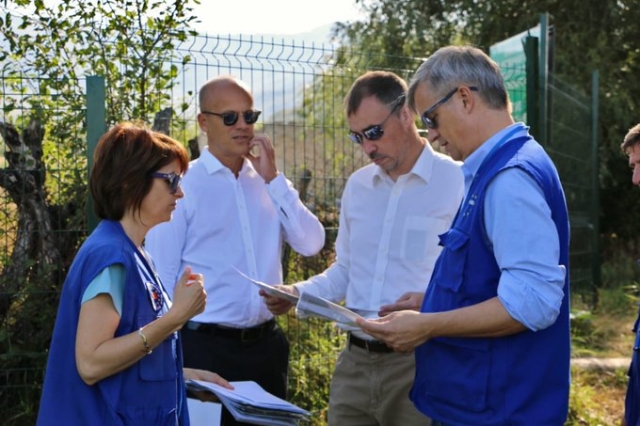Co-Chairs of Geneva Int’l Discussions Condemn 'Borderization' in Georgia
The co-chairs of the Geneva International Discussions (GID), which represents the only format of an ongoing international dialogue between Georgia and Russia, have released a statement regarding the illegal borderization process in the vicinity of the village of Gugutiantkari, in Gori Municipality, close to the Russian-occupied Tskhinvali (“South Ossetia”) region.
In the statement, the chairs stress that the recent developments in Gugutiantkari have raised tensions on the ground and have humanitarian consequences for the local people.
“The newly erected structures hinder freedom of movement for people living there, prevent them from reaching their orchards and threaten access to the irrigation system,” the statement reads.
It also says that the co-chairs of the GID will continue to be in contact with the relevant actors, drawing their attention to this and other pressing issues and call on them to make full and responsible use of the existing mechanisms for communication to resolve the current and other concerns.
Eric Hogg, Head of the European Union Monitoring Mission to Georgia (EUMM), visited Gugutiantkari with the two co-chairs of GID on August 28. He noted that the new fencing further divides local communities.
“Together with 2 GID co-chairs I joined #EUMM patrol this morning to observe the ‘borderization’ near Gugutiantkari at the Administrative Boundary Line. New fencing further divides communities,” he wrote in twitter.
EU Special Representative for the South Caucasus and the Crisis in Georgia, Toivo Klaar, who also went to the site, said the “borderization” cannot be accepted.
“Fencing divides communities and causes hardship. ‘Borderization’ cannot be accepted,” Klaar tweeted.
The Minister of Foreign Affairs of Georgia, David Zalkaliani, also had a meeting with the GID Co-Chairs on Wednesday.
The FM told reporters the meeting had concerned the process of “unlawful borderization” on the administrative line - the demarcation and moving of the separation line by occupying forces intermittently taking place in locations adjacent to the administrative boundary line. According to him, Georgia will use all opportunities to prevent unlawful actions along the administrative boundary line separating Russian-occupied Abkhazia and South Ossetia.
The GID were launched in Geneva, Switzerland, in October 2008, to address the consequences of the 2008 August war, which left 20% of Georgia occupied by Russia.
The talks are usually held with the co-chairmanship of the EU, UN and OSCE, and with the participation of Georgia, the Russian Federation and the USA. The representatives of Georgia’s breakaway regions, the Sokhumi and Tskhinvali occupation regimes, also attend the working group sessions.
The discussions are usually held within a two meeting-group format. At one meeting, the sides discuss security and stability issues in Georgia’s breakaway Abkhazia and Tskhinvali regions, while the second meeting concerns the dignified and safe return of Internally Displaced Persons (IDPs) and refugees to their homes in the occupied regions.
Within the format, Georgia made a unilateral pledge of non-use of force on 23 November 2010 and has since insisted Russia should do the same. The Russian government refuses to follow suit, alleging it is not a party to the conflict. Instead, it wants Georgia to sign treaties envisaging non-use of force directly with Abkhazia and South Ossetia, which Georgia refuses to do.
The sides of the talks also have a disagreement over the issue of return of IDPs and refugees, mostly ethnic Georgians, to their homes. Each time the topic is raised within the format, Russia and representatives of de facto authorities of Abkhazia and South Ossetia leave the negotiation table in protest.
By Thea Morrison
Image source: Toivo Klaar twitter












